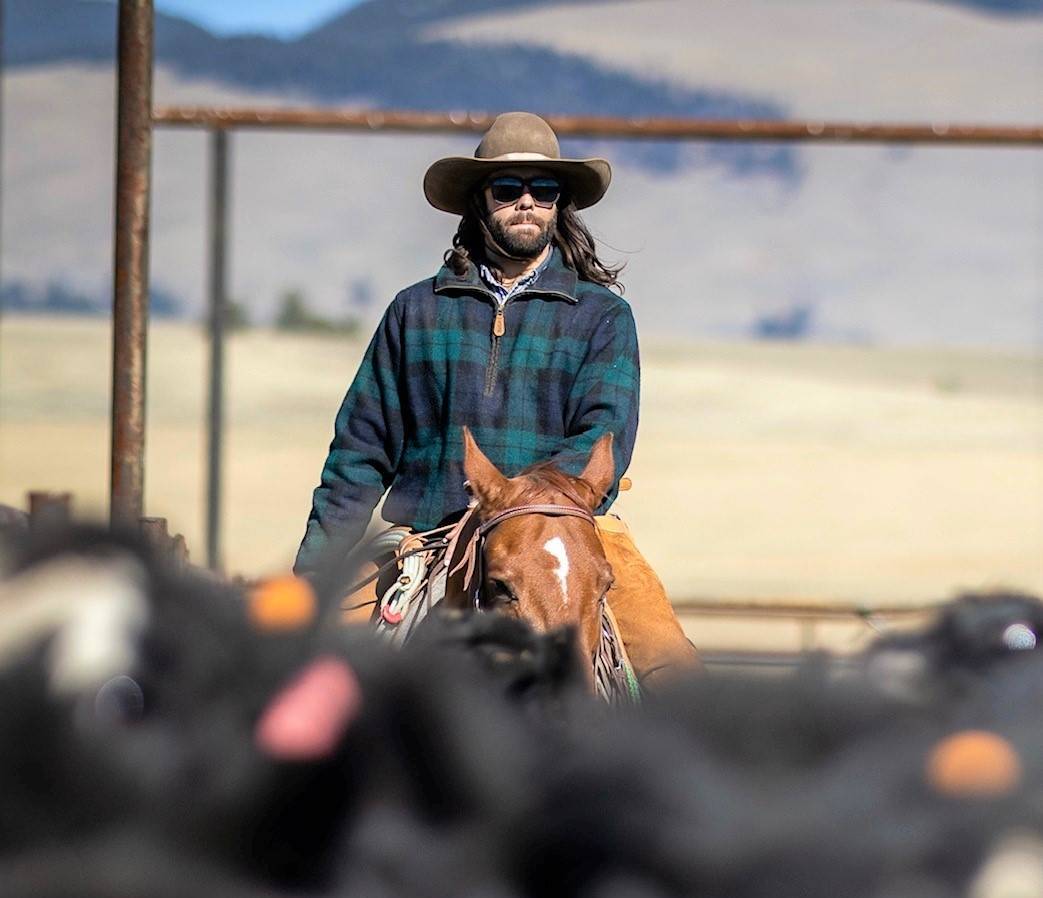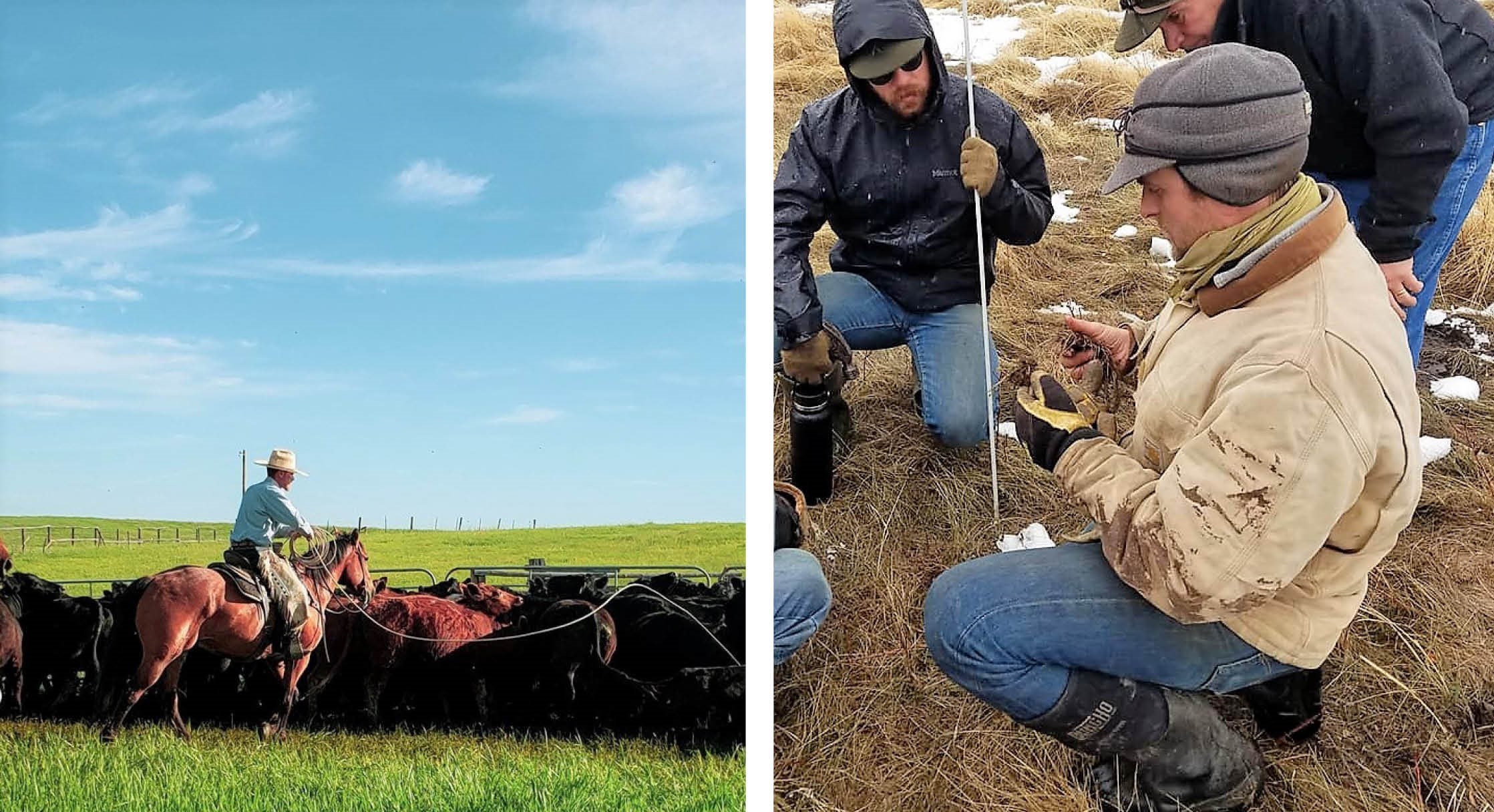Ranching Systems Degree
The Ranching System degree in the Montana State University Dan Scott Ranch Management Program is designed to produce graduates equipped to solve problems in the ever-changing landscape of the ranching industry. Graduates are ready to forge a pathway to management on a ranch, or in any of the many support industries that serve the ranching community.
In addition to a diverse array of classroom and experiential coursework in animal production, natural resources management, economics and business, students gain valuable hands-on experience through two summer-long internships on actual working ranches in and outside of Montana.
This unique program provides students real-world experience while enhancing communication and leadership skills.
Click here to download a pdf of this information.

Carlo Giovannitti (Class of 2025) is a U.S. Marine Corps veteran from New Jersey.
The Curriculum
Students in the program take courses centered on three academic pillars:
Students gain a foundation in biological and natural sciences, animal breeding and genetics, reproduction, physiology, nutrition and livestock production. We also offer specialized coursework that incorporates sustainable resource management and wildlife-livestock interactions.
Students explore rangeland resources and management principles, studying ecology, water resource management and methods of conservation and sustainable management for the benefit of current and future generations.
Coursework fosters a broad understanding of business concepts and practices that support ranch management. Classes cover topics including financial accounting, international business, spreadsheet and databases, management and organization, negotiations and human resources.
Our graduates will:
- Design and evaluate sustainable ranch management systems by synthesizing and applying knowledge of livestock production, business and economic aspects of ranch management, and rangeland ecology and management to a systems-level approach to ranch management. [knowledge]
- Critically review and evaluate information to make decisions regarding the management of the whole ranching enterprise in order to achieve management goals. [critical thinking]
- Demonstrate effective oral and written communication to a range of audiences and within collaborative environments. [communication and collaboration]
- Use scientific principles to formulate questions, explore solutions, and solve real-world problems and advocate based on scientific principles. [problem solving]
- Practice ethical conduct appropriate to the professional community and advocate for sustainable management of all resources involved in the ranching industry. [ethics]
A minimum of 120 credits is required to graduate, 42 must be 300-level or above.
Admission required at the junior level. Transfer students must pursue sophomore level courses at MSU.
CR = course credits, YR = year (FR = freshman, SO = sophomore, JR = junior, SR = senior).
Ranching Systems Degree |
||||
|---|---|---|---|---|
| Dept/Course# | Course Title | CR | YR | Semester |
|
AGED 140US
or
COMX 111US
|
Leadership Dev for Ag & Ind Employee | 3 | FR | FS (F) |
| Public Communication | FS(F) | |||
| BIOB 170 | Principles of Biological Diversity | 4 | FR | FS(F) |
|
CHMY 121IN & CHMY 122IN |
Intro General Chemistry Intro General Chemistry Lab |
3 1 |
FR | FSSu(F) |
| NRSM 101 | Natural Resource Conservation | 3 | FR | F |
| NRSM 102 | Montana Range Plants Lab | 1 | FR | F |
| ANSC 100 | Intro Animal Science | 3 | FR | FS(S) |
| BIOB 160 | Principles of Living Systems | 4 | FR | FS(S) |
| ECNS 101IS | Economic Way of Thinking | 3 | FR | FS(S) |
| WRIT 101W | College Writing I | 3 | FR | FSSu(F) |
Transfer students must pursue Sophomore level courses at MSU
| Dept/Course# | Course Title | CR | YR | Semester |
|---|---|---|---|---|
| ACTG 201 | Principles of Financial Acct | 3 | SO | FSSu(F) |
| ANSC 202 | Livestock Feeding | 3 | SO | F |
| NRSM 240 | Natural Resource Ecology | 3 | SO | F |
|
CHMY 123 & CHMY 124 |
Intro to Organic Chemistry and Biochem Intro to Organic Chem/Biochem Lab |
3 1 |
SO | FSSu(F) |
| STAT 216Q | Intro to Statistics | 3 | SO | FSSu(S) |
| ACTG 202 | Principles of Managerial Acct | 3 | SO | FSSu(S) |
| ANSC 234 | Livestock Mgmt Beef 1 | 1 | SO | S |
| ANSC 265 | Anatomy and Physiology of Domestic Animals | 3 | SO | S |
| ANSC 266 | Anatomy & Physiology of Dom Animals Laboratory | 1 | SO | S |
| BGEN 242D | Intro to International Business | 3 | SO | FS(S) |
| BMIS 211 | Speadsheet and Database Skills | 3 | SO | FSSu(S) |
Admissions required to Upper Level Program
| Dept/Course# | Course Title | CR | YR | Semester |
|---|---|---|---|---|
| RS 398 | Junior Internship | 1 | JR | Su |
| ENSC 245IN | Soils | 3 | SO | F |
| ANSC 320 | Animal Nutrition | 3 | JR | F |
| ANSC 321 | Physiology of Reproduction | 4 | JR | F |
| RS 306 | Livestock Mgmt in RS | 1 | JR | F |
| IA or IH core | University required core course | 3 | JR | FSSu(F) |
| ANSC 322 | Princ Animal Breeding & Genetics | 3 | JR | S |
| ANSC 337 | Disease of Domestic Lvstk | 3 | JR | S |
| AGBE 210 | Economics of Ag Business | 3 | SO | FS(S) |
| BIOO 230 | Identification of Seed Plants | 4 | SO | S |
| BMGT 335 | Management & Organization | 3 | JR | S |
| RS 316 | Forage Mgmt in RS | 1 | JR | S |
| Dept/Course# | Course Title | CR | YR | Semester |
|---|---|---|---|---|
| RSP 498 | Senior Internship | 1 | SR | Su |
| IA or IH core | University Required Core Course | 3 | SR | FSSu (F) |
| ANSC 434R | Beef Cattle Management | 4 | SR | F |
| AGSC 342 | Forages | 3 | JR | F |
| RS 406 | Finances & Decision Making in RS | 1 | SR | F |
| BMGT 406 | Negotiation/Dispute Resolution | 3 | SR | FS(F) |
| NRSM 353 | Grazing Ecology and Mgmt | 3 | SR | S |
|
WILD 420 or NRSM 430 |
Range & Wildlife Policy and Planning or NRSM 430 Natural Resource Law |
3 | JR | S |
| WILD 426 | Wildlife Habitat Management | 3 | SR | S |
|
NRSM 455 or ENSC 272CS |
Riparian Ecology & Mgmt or ENSC 272 CS Water Resources |
3 | SR | S |
| RS 416 | Systems Thinking for Ranch Managers | 2 | SR | S |

Learn by Doing: Summer Internships
Click here to read student internship highlights.
The Ranching Systems degree offers a highly individualized educational experience. Admission to the Dan Scott Ranch Management program's upper level is limited to 10 students per year to ensure the experience is singularly tailored to each student.
Students accepted into this unique program are paired with a partner ranch for two consecutive, summer-long internships. These for-credit internships are hosted by exemplary working ranches and provide the hands-on opportunity to effectively bridge the gap between the principles you learn in the classroom and real-world application in ranch management.
During the second summer, students work closely with their host ranch to solve a specific problem or to explore a potential opportunity, allowing them to apply their knowledge and skills in a real-world situation.
"My biggest takeaway from this program is you do get to experience something different...get out of your comfort zone." ~ Georgia Wortman, Class of '23
Georgia Wortman (Class of 2023) grew up on a ranching operation in Big Sandy, Montana.
What Makes Us Different?
Montana State University has outstanding discipline-specific undergraduate programs in Agricultural Economics, Agricultural Business, Business, Animal Science, and Natural Resources and Rangeland Ecology. A 2016 survey of Montana ranchers and allied industries indicate that all of these areas of study are important for an undergraduate program educating future ranch managers.
The table below shows the general program structure in the three related programs, along with the Ranching Systems Degree Program. The Ranching Systems Degree is a systems-level, rather than a discipline-specific approach, to educating and training outstanding graduates in the field of ranch management.
Ranching Systems Degree vs. Other Majors at MSU |
||||
|---|---|---|---|---|
|
Course
Category
|
Ag Business,
Farm and Ranch
Concentration
|
Animal Science
Livestock, Management and Industry option
|
Natural Resources and Rangeland Ecology; Rangeland Ecology and Management option
|
Ranching Systems Degree
|
| Credits | ||||
| Econ and Business | 45 | 15 | 3 | 27 |
| Animal Science | 9a | ~43 | ~10 | 28 |
|
Rangeland Ecology/
Environmental Studies
|
~15 | ~61 | 29 | |
|
Freshman level math (including calculus
and stats 216),
biology, and chemistry
|
16 | 15 | 19 | 19 |
| Internship, Seminar, etc. | 0 | 3 | 0 | 7 |
|
a combination of range/ecology and animal science
~ = includes blocks in which multiple discipline options are available
|
||||
Success after MSU: Career Opportunities
The Ranching System degree prepares you for a successful career in the ranching industry.
Graduates are prepared to enter the ranch management field and make an immediate impact
while building upon their collegiate experience.

Tristan Bess, the first student to enter the Dan Scott Ranch Management Program, graduated in December 2021.
Tristan Bess, of Wilton California, became the first student to earn a bachelor's degree in ranching systems from the Dan Scott Ranch Management Program.
Tristan completed two summer interships on the Padlock Ranch in Ranchester, Wyoming. During his first summer, he worked with the ranch's replacement heifers. During his second year, he developed a decision support tool to compare different heifer development strategies for the ranch.
